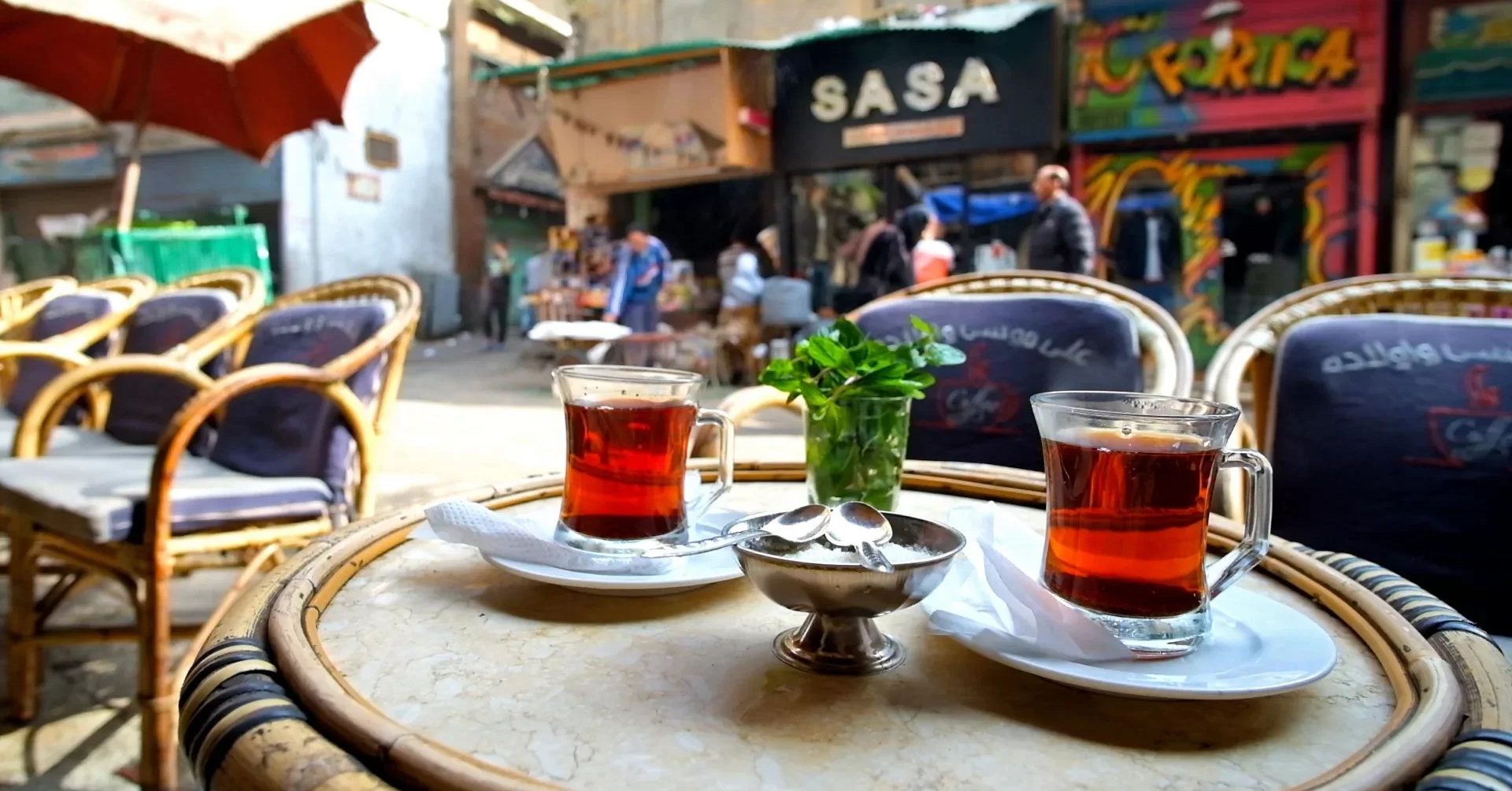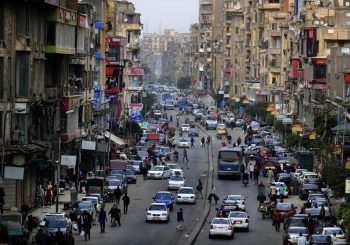On most mornings, Sarah Hisham does not feel awake until she has had her first cup of coffee. Sometimes, it is the first of five.
Like millions of Egyptians, the 29-year-old social media manager relies on caffeine to power through long workdays, social obligations, and the fast pace of life. Caffeine permeates daily life in Egypt, from the black tea traditionally offered to guests to the ever-present sodas and energy drinks found on store shelves. However, many consumers are still unaware of caffeine’s effects on the body.
Egyptians rank among the world’s most avid caffeine consumers, with black tea topping the list of preferred beverages, whereas a 240 ml cup of black tea contains around 47 mg of caffeine, 60–76 mg for instant coffee, 80–150 mg for energy drinks, and about 23 mg for a can of soda.
A 2018 study found that 61.4 percent of the population drinks at least one caffeinated beverage daily, with 36.6 percent exceeding the European Food Safety Authority’s (EFSA) recommended limit of 400 milligrams, reaching close to 760 mg of caffeine per day.
“Tea is a staple in every Egyptian household,” Hisham said. “I’m always offered tea when I visit someone, and I make it for my guests too.”
Even casual socializing, she added, often revolves around coffee. “It’s easy to find a nearby café and sit down for a cup,” she said. For many, it’s a convenient, low-cost alternative to more time-consuming outings.
Coffee, whether Turkish or instant, also holds a significant place in Egyptian households, with the average yearly consumption per person rising by 26.3 percent to 0.72 KG in 2021 from 0.57 KG in 2020, reflecting a steady increase.
Coffee and tea are the most socially acceptable stimulants in the world. Approximately 90 percent of all adults in the world consume caffeine in their daily diet as of 2025.
Caffeine, a natural stimulant found in coffee and cocoa beans, tea leaves, and kola nuts, stimulates the central nervous system to promote wakefulness. By blocking adenosine, a chemical that induces drowsiness, caffeine diminishes fatigue and heightens alertness and concentration.
“Caffeine’s main benefit is improved concentration,” Rana Shams, a nutritionist, told Egyptian Streets. “It also enhances physical performance, which is why many athletes use it as a pre-workout and why it’s commonly found in pre-workout supplements.”
Caffeine is also associated with mood enhancement, regulating emotions and sleep, reducing physical fatigue, as well as increasing metabolism, affecting the appetite, and contributing to weight management.
“Caffeine is widely consumed throughout Egypt across all ages and in different beverages, with many relying on it to boost alertness and improve focus,” Shams said.
Without morning coffee, Hisham feels fatigued and foggy. “I would also drink another cup or two in the office to really get into my tasks.”
She has been drinking instant coffee every morning and throughout the day for 11 years, from three to five cups a day with milk and sugar. Hisham began the habit in her final year of high school, Thanaweya Amma, to stay awake longer while studying, like many other students.
A 2024 Sohag University study found that among 350 healthy medical students surveyed between the ages of 18 and 22, around 86.3 percent of them regularly drank caffeinated beverages. Tea was the most popular, consumed by 82.7 percent, followed by coffee at 78.8 percent, carbonated drinks at 49.3 percent, and energy drinks at 36.7 percent, with overlap between these groups.
The health effects of caffeine are complex. While moderate intake, around 200 to 400 milligrams per day, is generally safe for most healthy adults, it can also offer benefits, including potential protection against Parkinson’s and Alzheimer’s diseases.
“Many people aren’t aware of the recommended caffeine limit,” Shams told Egyptian Streets, noting that children should stay under 100 mg per day, while pregnant women should not exceed 200 mg.
Caffeine poses particular risks for certain groups. According to the World Health Organization (WHO), high intake during pregnancy has been linked to miscarriage and low birth weight. “Caffeine can cross the placenta, potentially increasing miscarriage risk,” Shams echoed. The American College of Obstetricians and Gynecologists (ACOG) similarly advises pregnant and nursing women to limit their intake to avoid harm to the fetus or infant.
Additionally, excessive caffeine can cause insomnia, anxiety, elevated heart rate, and digestive problems, especially for those with acid reflux or hypertension. The 2024 study also found that individuals with cardiovascular conditions should closely monitor their intake to prevent complications such as high blood pressure or stroke.
Children and teenagers are particularly sensitive to caffeine’s side effects, which may include anxiety, dehydration, acid reflux, and sleep disturbances.
A 2023 study in Damanhur, Egypt, found that energy drinks are increasingly popular, especially among children, adolescents, and young athletes, who together make up nearly half of all consumers. Reflecting this trend, reports from 2022 revealed that school students regularly consume these beverages despite 18+ age warnings, prompting school authorities to issue health advisories.
Young adults, among the highest consumers in Egypt, may be especially vulnerable to both intoxication and withdrawal symptoms.
According to the Diagnostic and Statistical Manual of Mental Disorders, Fifth Edition (DSM-5), caffeine intoxication typically occurs after consuming more than 250 milligrams, with symptoms such as rapid heartbeat, restlessness, muscle twitching, insomnia, and increased urination. Withdrawal symptoms, including headaches and irritability, are also common.
Among Egyptian participants in the 2024 study, 82.5 percent showed signs of caffeine intoxication, while 72.5 percent reported withdrawal symptoms. The most common complaints were headaches, difficulty concentrating, and mood changes.
Caffeine’s stimulating effects can make caffeinated drinks quite addictive. After years of consumption, Hisham has built a high tolerance to the alerting effects of coffee, and now she uses caffeine for relaxation.
“Instant coffee became my favorite drink,” Hisham said. “I crave the taste, and sometimes, holding the cup and sipping soothes me as an action in itself.” She noted that sometimes she drinks a cup of coffee before bed as it warms and relaxes her, and she falls asleep with ease.
Hisham sometimes experiences caffeine’s negative effects, noticing only when a specific headache signals she’s had too much, usually after long hours of drinking coffee.
Like millions of Egyptians, she consumes caffeine daily, often unaware of its potential risks, part of a broader wave of misconceptions that cloud public awareness.
Shams noted that many people falsely believe that green tea is caffeine-free and harmless. “Black tea contains about 47 milligrams of caffeine per cup, more than green tea’s 29 milligrams, but both are caffeinated,” she explained.
Another common myth, she noted, is that tea can be consumed endlessly because it is not as strong as coffee. While tea generally contains less caffeine, about half the amount found in coffee, Shams emphasized that moderation remains essential.
“A lot of people also think caffeine is only in black tea and coffee,” she said. “But it’s also in chocolate, soda, and energy drinks—things many people consume every day without thinking twice.”
Caffeine is not necessarily harmful, Shams added. “It becomes a problem only when it’s overused.”
In a country where tea is offered before greetings begin and coffee accompanies work and rest, caffeine remains a fuel for Egyptians.







Comments (0)